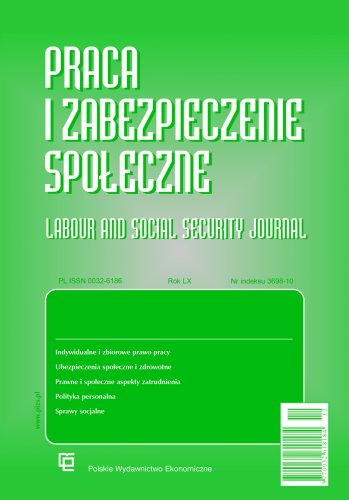The missing fundamental rights protection in the CJEU's case C-948/19 UAB "Manpower Lit"
Zagubiona ochrona praw podstawowych w wyroku TSUE w sprawie C-948/19 UAB „Manpower Lit”
This case deals with two legal issues concerning Directive 2008/104/EC. The first issue concerns the interpretation of the scope of the Directive in relations to an EU agency, i.e. the European Institute for Gender Equality (EIGE). Thereto the Court of Justice of the EU (CJEU) had to establish whether such an agency fulfils the three requirements of Article 1(2) Directive 2008/104/EC: EIGE must fall within the definition of "public undertaking"; be a "user undertaking"; and must be engaged with "economic activities." Following the EU's autonomous interpretations of these three requirements, the Court concluded positive on all three of them. The second legal issue deals with the question whether the principle of administrative autonomy of an EU agency as laid down in Article 335 of the Treaty on the Functioning of the European Union (TFEU) will be hindered when temporary agency workers are treated equally in terms of their basic working and employment conditions (Article 5(1) Directive 2008/104/EC) as those workers who are directly employed by the EU agency. The CJEU's conclusion is that such is not the case, since 1) the comparison is to be made at the level of the tasks of the job, and 2) the workers did not claim full equal treatment, but equal treatment on wages which is covered as a basic working condition by Directive 2008/104/EC).
Sprawa, o której mowa w artykule, dotyczy dwóch zagadnień prawnych związanych ze stosowaniem dyrektywy 2008/104/WE. Pierwsza kwestia dotyczy interpretacji zakresu jej zastosowania w odniesieniu do agencji unijnej — Europejskiego Instytutu ds. Równości Płci (EIGE). Trybunał Sprawiedliwości Unii Europejskiej (TSUE) musiał ustalić, czy taka agencja spełnia trzy wymogi określone w art. 1 ust. 2 dyrektywy 2008/104/WE, a mianowicie, czy mieści się w definicji „przedsiębiorstwa publicznego”, czy jest „przedsiębiorstwem użytkownikiem” i czy jest zaangażowana w „działalność gospodarczą”. Z uwagi na autonomiczną interpretacją tych trzech wymogów, Trybunał stwierdził spełnianie każdego z nich. Drugie zagadnienie prawne sprowadza się do pytania, czy zasada autonomii administracyjnej agencji UE, o której mowa w art. 335 Traktatu o funkcjonowaniu Unii Europejskiej, dozna uszczerbku w przypadku, gdy pracownicy tymczasowi wykonujący w niej pracę będą traktowani, w zakresie podstawowych warunków pracy i zatrudnienia (art. 5 ust. 1 dyrektywy 2008/104/WE), na równi z pracownikami zatrudnionymi bezpośrednio przez tę agencję. TSUE sformułował w tym zakresie odpowiedź przeczącą, wskazując, że: 1) porównania należy dokonać na poziomie zadań wykonywanych na danym stanowisku, 2) pracownicy nie domagali się pełnego równego traktowania, ale równego traktowania w zakresie wynagrodzeń, które mieszczą się w pojęciu podstawowego warunku pracy zgodnie z dyrektywą 2008/104/WE.
Bibliografia
References/Bibliografia
Fredman, S. (2008). Reforming Equal Pay Laws'. Industrial Law Journal, 37(3),193–218. https://doi.org/10.1093/indlaw/dwn008
Schlachter, M. (2012). Transnational Temporary Agency Work: how much equality does the equal treatment principle provide? Journal of Comparative Labour Law & Industrial Relations, 28(2). https://doi.org/10.54648/IJCL2012012

